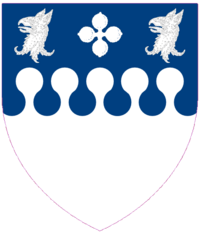Nathaniel Lindley, Baron Lindley facts for kids
Quick facts for kids
The Lord Lindley
|
|
|---|---|
 |
|
| Lord of Appeal in Ordinary | |
| In office 10 May 1900 – 2 December 1905 |
|
| Preceded by | The Lord Morris |
| Master of the Rolls | |
| In office 19 October 1897 – 9 May 1900 |
|
| Preceded by | The Lord Esher |
| Succeeded by | The Lord Alverstone |
| Personal details | |
| Born |
Nathaniel Lindley
29 November 1828 Acton Green, London, England |
| Died | 9 December 1921 (aged 93) |
| Citizenship | United Kingdom |
| Parent | John Lindley |
| Education | University College School |
| Alma mater | University College London |
Nathaniel Lindley, Baron Lindley (born November 29, 1828 – died December 9, 1921) was an important English judge. He held many high positions in the legal system during his long career.
Contents
Early Life and Education
Nathaniel Lindley was born in Acton Green, London. His father, Dr. John Lindley, was a famous botanist (someone who studies plants). Nathaniel also had a famous ancestor on his mother's side, Sir Edward Coke, who was a very important lawyer and judge many centuries ago.
Nathaniel went to University College School. He also studied at University College London and the University of Edinburgh. Later in his life, he received special degrees from the University of Cambridge and the University of Oxford.
Legal Career
Nathaniel Lindley became a lawyer in 1850. He started working in the Court of Chancery, which dealt with fairness and justice in legal cases.
He wrote some very important books about law. In 1860, he published a two-volume book called Treatise on the Law of Partnership. This book was about how partnerships work, including how they apply to companies. This work later became two well-known legal textbooks: Lindley on Companies and Lindley on Partnership. These books are still used by lawyers today!
In 1872, he became a Queen's Counsel, which is a special title for experienced lawyers.
Becoming a Judge
In 1875, Nathaniel Lindley became a judge in the Court of Common Pleas. This was a bit unusual because he was a "chancery barrister" (a lawyer who worked in the Court of Chancery), but he was appointed to a "common-law court." This happened because the legal system was changing. Different types of law, like common law and equity, were being brought together.
He was also knighted in 1875, which meant he could use "Sir" before his name. In 1881, he was promoted to a higher court, the Court of Appeal. He also became a member of the Privy Council, a group of important advisors to the King or Queen.
In 1897, Sir Nathaniel Lindley became the Master of the Rolls. This is a very important judicial role in England. Then, in 1900, he was made a Lord of Appeal in Ordinary. This meant he became a member of the House of Lords and was given the title Baron Lindley. He retired from his judicial role in 1905.
Lord Lindley was the very last person to be appointed as a Serjeant-at-law. This was an old legal title, and judges used to have to be serjeants. After him, this rule changed.
A mountain in Antarctica, Mount Lindley, is named after him!
Family Life
Nathaniel Lindley married Sarah Katharine Teale in 1858. They had nine children together. Some of their children also became well-known, including Sir Francis Oswald Lindley, who was a diplomat, and Major-General John Lindley, who was an army officer.
Lord Lindley passed away at his home in East Carleton, near Norwich, in 1921.
Coat of Arms
|
Important Writings
Lord Lindley is famous for his legal books. His most notable works are Lindley on Companies and Lindley on Partnership. The book about partnerships, now called Lindley and Banks on Partnership, is still published today and is in its 20th edition (as of 2017). This shows how important and lasting his legal writings have been.
 | Anna J. Cooper |
 | Mary McLeod Bethune |
 | Lillie Mae Bradford |



